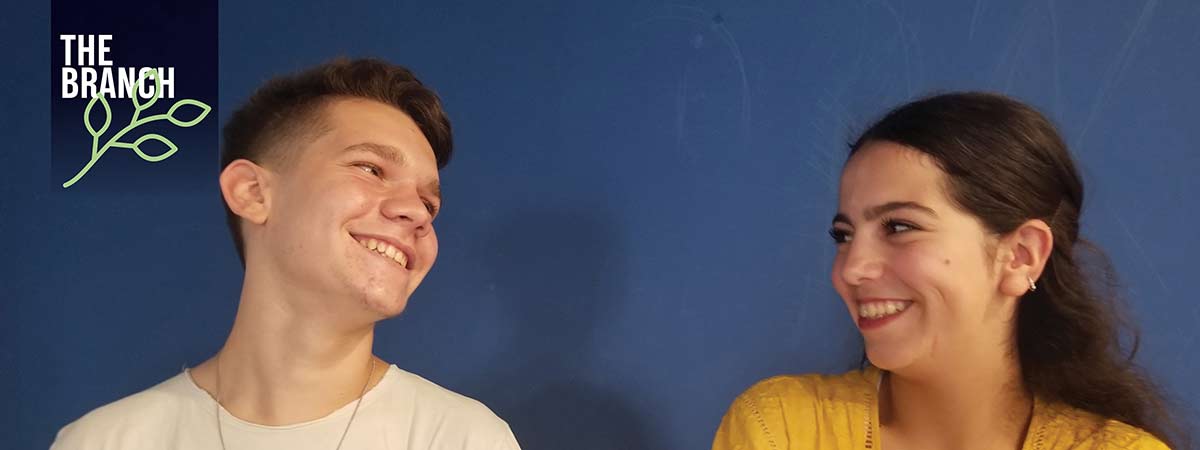Episode 13: Kid Power
Talia dances, loves drawing, and traces her Muslim ancestry back to Jerusalem's Old City. Shali is the wise-cracking son of an Israeli rapper. The teens met by joining Israel’s only youth movement for peace. Listen as they teach us what it means to be Kids4Peace in 2019.
The Branch Ep. 13: Kid Power
By Dina Kraft
Something Israeli and Palestinian kids have in common is that many of them spend time in youth movements growing up. It’s a distinctive part of the culture here – the younger kids in elementary and middle school are led by high schoolers through informal after-school activities: games, races and discussions, hikes and trips over school holidays and summer camps.
Some of the movements have political bents or are sponsored by specific political parties, others affiliated with religious movements, or focused on orienteering or sailing. And largest of all are the scouting groups.
But what you won’t find in most of these groups is a mix of Israeli and Palestinian kids spending these afternoons and doing this kind of informal learning and fun together.
That’s what makes the interfaith youth movement, Kids4Peace Jerusalem, so exceptional.
It brings together Israeli and Palestinian youth – Jews, Christians and Muslims. In addition to the games and hikes of any youth movement, the youth also spend time learning about each other’s histories, religions and narratives of the conflict that so often divides them.
On the day I visit with the group, I take a seat in the “Youth Room” of Jerusalem’s storied YMCA building. It’s a large, cheerful space. On a recent Thursday, laughter and the sounds of Arabic, Hebrew and English bounce off the red and blue walls as the new cohort of high school students (who are the counselors) gather for the only youth group of its kind in the city.
It’s there that I meet Talia Jabsheh and Shali Street. They are both 16 and are new counselors. The two grew up in Jerusalem. Shali is from a village on the outskirts of the western part of the city -- that’s where the majority of the city’s Jewish population lives -- and Talia lives in a neighborhood in mostly Arab East Jerusalem.
When you grow up on opposite sides of the city’s ethnic and political divide, interaction with peers your own age is rare.
Talia and Shali both joined the youth movement as sixth graders. For Talia, a dynamic girl who dances ballet and draws and paints, it was the first time she got to know Jewish Israeli kids her age. Shali, a good natured teen with a ready laugh, had more experience than most Jewish Israeli kids with Palestinian peers because he studies at the Max Rayne Hand-in-Hand Jerusalem School, a bilingual Arabic-Hebrew school. (You can “visit” the school for yourself in Episode 2.)
They admit that what first intrigued them about joining the youth movement was a chance to go to the United States, the summer they spent at the Kids4Peace camp in Vermont. But their curiosity for an international adventure transformed into a commitment to Kids4Peace and the work it is trying to do – build a community that fosters connections and skill building, so youth like them can help shift their societies towards a more peaceful future.
The two have fun together – they laugh, joke and tease each other. Shali’s father is Shaanan Street, one of Israel’s most famous rappers, and he too loves music, along with soccer and playing video games. This summer, when they were part of a delegation from Kids4Peace to Belfast, the capital of Northern Ireland, Shali led them in singing Hebrew pop songs.
Talia and Shali listened and learned on the trip, asked hard questions and today they talk about what lessons they can bring back to Jerusalem.
“I wanted to live normally,” says Talia. I found it interesting to hear from Talia that she looks at peace building not as a burden, but as fun, before going on to say: “I put responsibility on myself to teach other Palestinian kids to interact with Israelis and to really listen to them.”
Shali says he still thinks about something their Northern Irish guide told them: “He said that when he drives a car, he spends 90 percent of the time looking forward and 10 percent of the time looking in the rear view. And the problem with their conflict is that they're looking forward 10 percent of the time and 90 percent of the time [they're looking] in the rear view.”
He adds with a maturity that seems to belie his 16 years: “You always need to remember the thing that happened in the past. But you think: OK, this happened. How do we move forward?”
Go behind-the-scenes with host Dina Kraft: check out these photos from episode 13!
We'd love to know your thoughts, questions, and stories! Send us an email anytime at thebranch@hadassah.org and join our Facebook group.



